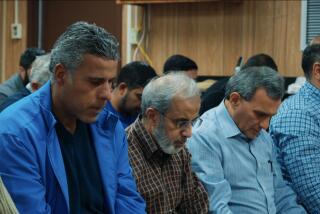Most Controversial Corner in D.C. : Voice of America’s Muslim Prayer Area Creates a Stir
- Share via
WASHINGTON — The first floor of the Voice of America building on Independence Avenue contains perhaps the most controversial 28 square feet in Washington: a Muslim prayer area.
Gray and rust fabric-covered partitions in one corner of a VOA office cordon off a 4-by-7-foot area used for prayer by Muslim employees who broadcast in the Hausa language to northern Nigeria and southern Niger.
“We’re concerned about it,” said Robert L. Maddox, executive director of Americans United for Separation of Church and State. “We don’t want to be insensitive, but we are always concerned when the government begins to provide chaplains and prayer rooms.”
The American Civil Liberties Union said it is “investigating.”
During a reporter’s visit, the prayer area, in the northwest corner of the VOA at 330 Independence Ave. SW, was empty except for a small rug placed cater-cornered on the floor. Two prayer rugs put down earlier were stolen, employees said.
Muslim employees, who work day and night shifts, retreat there to offer prayers if they are scheduled to work at dawn, midday, midafternoon, sunset or late evening. Two prayers may be combined, and the prayer hour varies to accommodate the work necessary, employees say.
The furor over the prayer area at the VOA may provide a taste of the future. The Constitution prohibits the establishment of religion but in the same sentence protects the right to “the free exercise thereof.” Recent battles over city-sponsored creches and school-sponsored Christmas carols may be fought next, for example, over government-sanctioned Muslim prayer areas as the nation becomes more religiously diverse.
David Williams, chief of the Africa division of the VOA, strongly defends the prayer area as no different than the meditation room at the Pentagon, no different than a Christian reading his Bible on his lunch hour.
“There is a lot of misunderstanding of Islam,” said Lawal Jibiya, senior editor for the Hausa service. “We don’t want this to be an issue.
“We have important visitors from Nigeria, and most of them are Muslim. It is not nice to see them praying right out in the open,” Jibiya said. “We thought it was good public relations for the United States to have our prayer area. Anybody can go in there--Steve (Lucas, the son of a Christian missionary who grew up in Nigeria and speaks Hausa) can go in there and read his Bible.”
Jibiya said his prayers take three minutes, and there is no loss of work because of his religious commitment.
Pentagon chaplain Fred Smith said that while he was unfamiliar with the prayer area at the VOA, the Defense Department has a meditation room that is not sectarian, contains no symbols and represents nothing. “It is just a room where people can come and pray, or meditate, or just collect their thoughts,” he said. “It is not a chapel.
“Those who wish to participate can participate. The Muslims did ask my predecessor to use it, but they made no follow-up request. Depending upon availability of space, we will find a place if they ask,” Smith said.
“This is not something set up by management, but something the employees did as a very spontaneous thing,” said Beth Knisley, chief of media relations for the VOA. “It is very tiny, the farthest from any traffic area.
“I checked with the legal office,” she said, and it considers it a “reasonable accommodation to employees, like sitting at a desk and reading a Bible, the same sort of thing.”
Dale Bruce, spokesman for the regional office of the General Services Administration, said GSA regulations are silent on the question of prayer areas in public buildings. “Agencies are expected to make prudent use of space,” he said.
He said the GSA had received no official complaints from its cleaning staff about the room. The prayer space is valued at $750 per year, but, because it is in a corner, it could probably not be used for any other purpose, he said.
Isa Sabbagh, a retired senior Foreign Service officer and Arab expert, said that for Muslim prayer the “place does not matter as long as it is clean and the individual can be guided to the direction of Mecca.”
Lucas, a Hausa broadcaster, said Muslim employees once spread newspapers on the floor in an open area to offer their prayers. Then a supervisor was appointed who worked at a desk in the newsroom and Muslim employees used his office for prayers. Later, when the Hausa service was moved to the first floor of the VOA building, the Muslims used an area containing a water fountain.
“One chap in the service thought shoes should be taken off” when anyone went into the area, Lucas said. “This created a problem because of the water fountain.”
One employee blundered into the area by accident to get water for coffee, Knisley said. He was wearing shoes, and one Hausa employee considered the area desecrated, she said. Rumors flew around the VOA that the non-Muslim had been threatened.
But Williams said, “Nobody has officially complained.”
Norman Painter, head of the American Federation of Government Employees chapter at the VOA, said, “Rumors are about two cents a dozen. A large number are true, but only a very small percentage are provable.”
He said the union contract requires the VOA to accommodate employees’ personal religious beliefs. “Article 28 requires that if personal religious beliefs require him or her to be absent from work,” Painter said, “compensatory time shall be allowed unless his presence is essential.”
Painter said his only question about the practice was “why somebody is being that generous to that religious group.”
More to Read
Sign up for Essential California
The most important California stories and recommendations in your inbox every morning.
You may occasionally receive promotional content from the Los Angeles Times.










